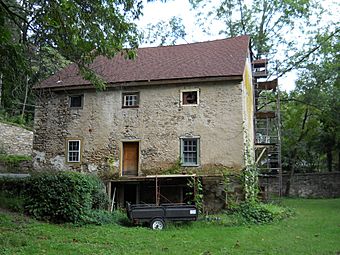Fetter's Mill facts for kids
Quick facts for kids |
|
|
Fetter's Mill
|
|
|
U.S. Historic district
Contributing property |
|

Fetter's Mill, September 2012
|
|
| Location | 2543 Fetter's Mill Dr., Bryn Athyn, Lower Moreland Township, Pennsylvania |
|---|---|
| Area | less than one acre |
| Built | 1860 |
| Built by | Amos Addis, Gerald Glenn, Louis Ewald |
| NRHP reference No. | 99000647 |
| Added to NRHP | May 27, 1999 |
Fetter's Mill, also known as the Louis Ewald Studio—Residence, is a very old building in Bryn Athyn, Pennsylvania. It started its life as a grist mill, which is a special kind of factory. A grist mill uses large stones to grind grains like wheat or corn into flour. This historic building is located right next to the Pennypack Creek.
Contents
A Glimpse into Fetter's Mill History
Fetter's Mill was first built around the year 1740. That means it's over 280 years old! It was originally a busy place where farmers brought their crops to be turned into flour. This mill helped feed the local community for many years.
How the Mill Was Built
The mill building has five levels, making it quite tall. It was constructed using strong stone walls, which were then covered with a material called stucco. Stucco is a type of plaster that gives the building a smooth finish. Inside, the building used a "post and beam" construction style. This means it had strong vertical posts and horizontal beams to support the floors and roof. The roof itself was shaped like an "end gabled roof," which means it slopes down on two sides and has a flat, triangular wall at each end.
Changes Over Time
Around 1860, the mill was made even bigger. This was probably to handle more grain or improve its grinding process. But as time went on, fewer people needed traditional grist mills. So, in 1920, Fetter's Mill got a new purpose. It was changed into a home and an art studio.
The Louis Ewald Studio
The mill became the home and workplace of a talented decorative artist named Louis Ewald. He used the historic building as his studio to create beautiful art. This change helped preserve the old mill, giving it a new life. Next to the mill, you can still see the "tail race." This is a channel or ditch that carried water away from the mill's water wheel after it had been used to power the grinding stones.
Fetter's Mill: A Historic Landmark
Because of its long history and unique transformation, Fetter's Mill is considered a very important building. In 1999, it was officially added to the National Register of Historic Places. This is a list of places in the United States that are important to American history. Being on this list helps protect the building and recognize its value.
Fetter's Mill is also part of a larger area called the Fetter's Mill Village Historic District. This means that the mill, along with other nearby buildings, forms a special historical neighborhood.
 | Laphonza Butler |
 | Daisy Bates |
 | Elizabeth Piper Ensley |



